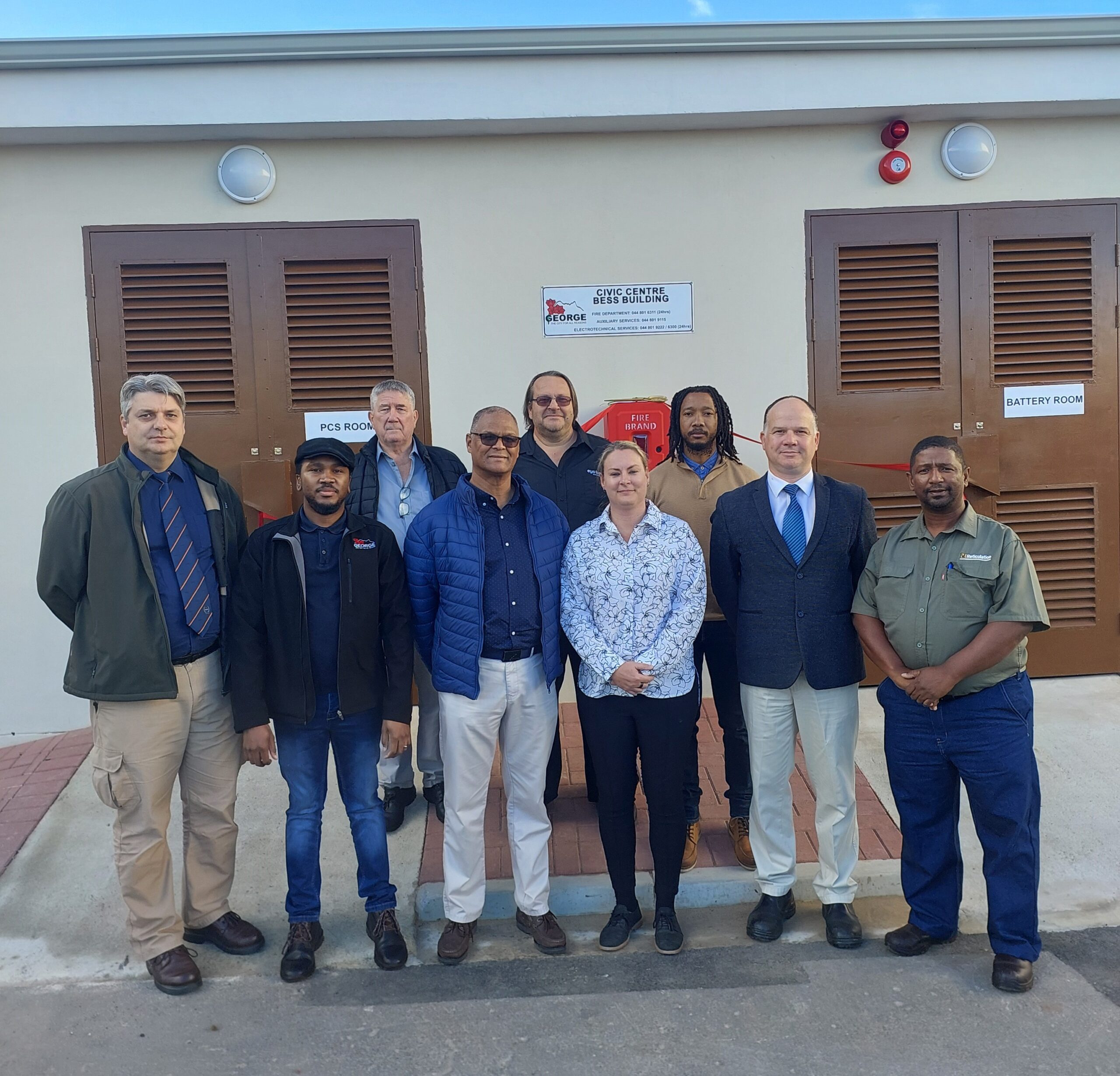George Municipality Launches R30 Million Battery Energy Storage Systems

In the photo: Front row, from left: Daniel Greeff (Deputy Director of Planning & Design Electro in the ElectroTechnical Services), Aphiwe Matiwane (Network Planning Engineer of Planning & Design Electro in the ElectroTechnical Services), Michael Rhode (Director of Electrotechnical Services), Ald Jackie von Brandis (Executive Mayor of George), Cllr Donovan Gultig (MMC for Electrotechnical Services) and Boetie Groenewald (Electrician at VE Reticulation)
Back Row from left: Carlo van Wyk (CVW Consulting Engineers), Herman Piek (Eya-Bantu) and Siyabonga Noyakaza (CVW Consulting Engineers)
The Executive Mayor of George, Alderman Jackie von Brandis, accompanied by the Mayoral Committee Member (MMC) for Electrotechnical Services, Councillor Donovan Gultig, and the Director of Electrotechnical Services, Mr Michael Rhode, officially launched the operation of three Battery Energy Storage Systems (BESS) on Thursday, 29 May 2025. The launch took place at one of the newly constructed BESS stations situated at the George Municipality’s main building on York Street.
Mayor von Brandis said the project highlights the City’s commitment to integrating innovative and sustainable energy solutions into its municipal grid. “The construction of these three BESS stations marks a significant step in optimising energy consumption. This initiative demonstrates our continued pursuit of energy efficiency and sustainability for the City of George,” said Mayor von Brandis.
According to Daniel Greeff, Deputy Director for Planning and Design in the Electrotechnical Services Department, the BESS units have been designed to complement the existing grid-tied photovoltaic (PV) solar systems within the municipal infrastructure.
“These systems are strategically distributed according to local energy demand,” Greeff explained. “A 1MWh Battery Energy Storage System (BESS) is paired with a 400kWp photovoltaic (PV) solar system at the Outeniqua Wastewater Treatment Works (WWTW); a 400kWh BESS is integrated with a 500kWp PV solar system at the Gwaing WWTW; and a 1.6MWh BESS is connected to a 300kWp PV solar system at the Municipal Main Offices near the Civic Centre.”
Reducing Diesel Costs and Enhancing Energy Resilience
The primary motivation behind the project was to address the high operational costs of diesel generators during loadshedding and unplanned outages. “A feasibility study showed that using BESS as the primary backup energy source would significantly reduce costs, as these systems require little to no operational and maintenance expenditure compared to diesel generators,” said Greeff.
Councillor Gultig expressed pride in the project’s successful implementation. “We are thrilled to see this initiative come to fruition. The Battery Energy Storage System represents a major advancement for George. It enables the Municipality to maintain critical services during load shedding, power outages, or load reduction periods without relying on costly diesel generators. This not only helps us cut costs but also strengthens our commitment to a greener, more sustainable future. It’s a proud milestone for our city,” Gultig said.
Cutting Peak Energy Costs and Supporting the Grid
In addition to mitigating disruptions during loadshedding, the BESS units will also be used for “peak shaving”—a strategy to reduce the Municipality’s electricity demand during high-cost peak periods. By storing electricity during off-peak hours and using it during peak times, the Municipality will significantly reduce energy expenses. This functionality will be activated when no loadshedding is in effect.
“Two of the three BESS systems are already operational and at the practical completion stage. These systems successfully prevented the generators from starting up during the most recent loadshedding events. The Civic Centre system is expected to be fully operational by the end of May 2025,” added Greeff.
Financial and Environmental Impact
Though the R30 million investment is considerable, the long-term benefits—both financial and environmental—are substantial. By maximizing the use of solar energy and reducing reliance on grid-supplied electricity during peak periods, the Municipality anticipates significant operational savings over time.
Moreover, the strategic integration of renewable energy and battery storage supports the Municipality’s broader energy resilience strategy. It sets a powerful example for future energy management and aligns with George’s commitment to sustainability and innovation in service delivery.

